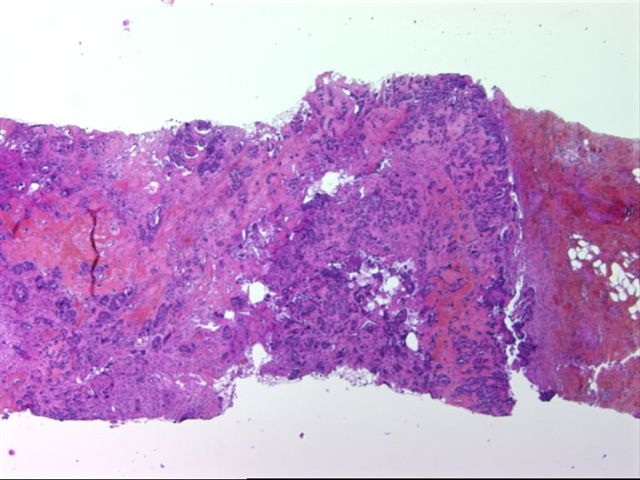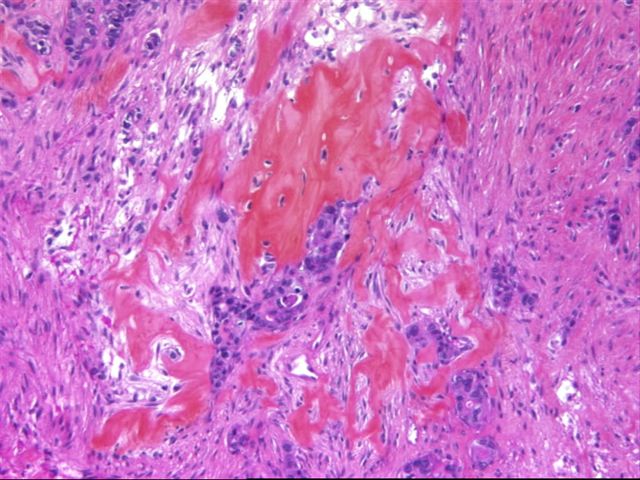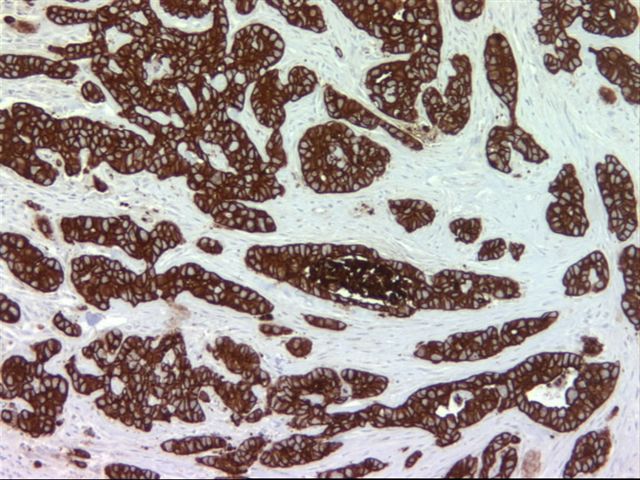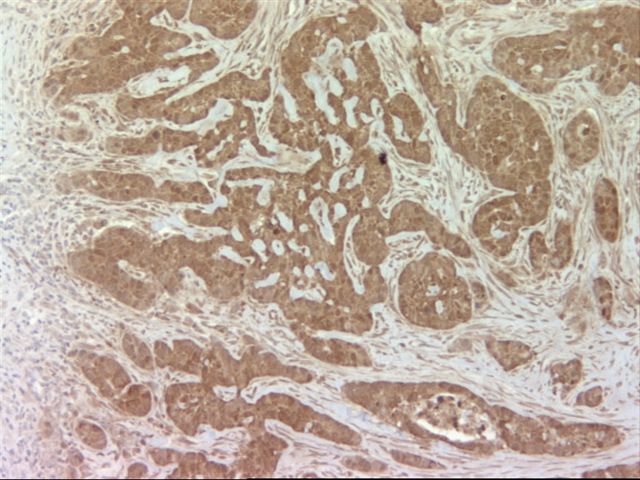5 May 2005 - Case of the Week #6
All cases are archived on our website. To view them sorted by case number, diagnosis or category, visit our main Case of the Month page. To subscribe or unsubscribe to Case of the Month or our other email lists, click here.
This case is sponsored by Daedalus Software, Inc., the Biosample Repository Automation Company, which is a bioinformatics and software company headquartered in Cambridge, MA. Daedalus Software, Inc. has 14 unique products which all cater to bioinformatics applications, biosample repository automation for diagnostic research, drug development, as well as tissue and organ for transplant. Daedalus Software has employees located at 4 offices in the U.S.A. and internationally. The company also custom-designs and co-develops new products with collaborators in the life science and healthcare industry segments. Daedalus operates with a fundamental philosophy of focusing on client service and product quality. Contact Info@DaedalusSoftware.com or 617-520-6604 x 4406 for more information.
This case was contributed by Dr. Inès Raoelfils, Centre Jean Perrin, Clermont-Ferrand, France.
Case of the Week #6
Clinical history:
A 66 year old woman had a well circumscribed breast mass and underwent needle biopsy.
Microscopic images:
Additional immunostains:
ER and PR negative
What is your diagnosis?
Diagnosis: Metaplastic carcinoma of the breast
Discussion:
Metaplastic carcinoma of the breast is a rare tumor in which the predominant component is not epithelial or glandular. It is also called sarcomatoid carcinoma, carcinosarcoma or spindle cell carcinoma. Distinction from invasive ductal carcinoma NOS is important because patients have shorter disease free survival and metastases tend to be hematogenous, not nodal. Metaplastic carcinoma has been classified into 3 categories: (a) carcinoma with an abundant matrix but without a spindle cell component, (b) spindle cell carcinoma with a lesser amount of carcinoma and (c) a biphasic pattern of malignant glandular and spindle elements (carcinosarcoma). The name metaplastic is due to the transformation of epithelial component into a nonglandular component, such as spindle cells, squamous cells or heterologous elements.
Morphologically, the sarcomatous component may resemble low gradefibromatosis or high grade fibrosarcoma, malignant fibrous histiocytoma, chondrosarcoma, osteosarcoma, rhabdomyosarcoma, angiosarcoma or a combination. The epithelial component may be glandular or squamous.
Immunohistochemical stains are notable for keratin staining of the spindle cells. A broad spectrum keratin cocktail or high molecular weight cytokeratin (34 beta E12) is recommended and is usually positive. Other keratin antibodies are less sensitive, as is S100. A recent report concluded that p63, with strong, diffuse nuclear staining, is a good marker to distinguish spindle cell metaplastic carcinomas from other mesenchymal neoplasms, with 87% sensitivity and 99% specificity (AJSP 2004;28:1506). The tumor in this case was not tested for p63. Most metaplastic carcinomas are negative for ER and PR (as in this case) and negative for HER2 overexpression. The epithelial and sarcomatoid components are derived from the same clone in most cases analyzed.
The differential diagnosis includes phyllodes tumor, nodular fasciitis, myofibroblastic tumor or primary breast sarcoma. A fibromatosis-like variant of metaplastic carcinoma has also been described (AJSP 2001;25:1009).
All cases are archived on our website. To view them sorted by case number, diagnosis or category, visit our main Case of the Month page. To subscribe or unsubscribe to Case of the Month or our other email lists, click here.
This case is sponsored by Daedalus Software, Inc., the Biosample Repository Automation Company, which is a bioinformatics and software company headquartered in Cambridge, MA. Daedalus Software, Inc. has 14 unique products which all cater to bioinformatics applications, biosample repository automation for diagnostic research, drug development, as well as tissue and organ for transplant. Daedalus Software has employees located at 4 offices in the U.S.A. and internationally. The company also custom-designs and co-develops new products with collaborators in the life science and healthcare industry segments. Daedalus operates with a fundamental philosophy of focusing on client service and product quality. Contact Info@DaedalusSoftware.com or 617-520-6604 x 4406 for more information.
This case was contributed by Dr. Inès Raoelfils, Centre Jean Perrin, Clermont-Ferrand, France.
Case of the Week #6
Clinical history:
A 66 year old woman had a well circumscribed breast mass and underwent needle biopsy.
Microscopic images:
Additional immunostains:
ER and PR negative
What is your diagnosis?
Click here for diagnosis and discussion:
Diagnosis: Metaplastic carcinoma of the breast
Discussion:
Metaplastic carcinoma of the breast is a rare tumor in which the predominant component is not epithelial or glandular. It is also called sarcomatoid carcinoma, carcinosarcoma or spindle cell carcinoma. Distinction from invasive ductal carcinoma NOS is important because patients have shorter disease free survival and metastases tend to be hematogenous, not nodal. Metaplastic carcinoma has been classified into 3 categories: (a) carcinoma with an abundant matrix but without a spindle cell component, (b) spindle cell carcinoma with a lesser amount of carcinoma and (c) a biphasic pattern of malignant glandular and spindle elements (carcinosarcoma). The name metaplastic is due to the transformation of epithelial component into a nonglandular component, such as spindle cells, squamous cells or heterologous elements.
Morphologically, the sarcomatous component may resemble low gradefibromatosis or high grade fibrosarcoma, malignant fibrous histiocytoma, chondrosarcoma, osteosarcoma, rhabdomyosarcoma, angiosarcoma or a combination. The epithelial component may be glandular or squamous.
Immunohistochemical stains are notable for keratin staining of the spindle cells. A broad spectrum keratin cocktail or high molecular weight cytokeratin (34 beta E12) is recommended and is usually positive. Other keratin antibodies are less sensitive, as is S100. A recent report concluded that p63, with strong, diffuse nuclear staining, is a good marker to distinguish spindle cell metaplastic carcinomas from other mesenchymal neoplasms, with 87% sensitivity and 99% specificity (AJSP 2004;28:1506). The tumor in this case was not tested for p63. Most metaplastic carcinomas are negative for ER and PR (as in this case) and negative for HER2 overexpression. The epithelial and sarcomatoid components are derived from the same clone in most cases analyzed.
The differential diagnosis includes phyllodes tumor, nodular fasciitis, myofibroblastic tumor or primary breast sarcoma. A fibromatosis-like variant of metaplastic carcinoma has also been described (AJSP 2001;25:1009).




